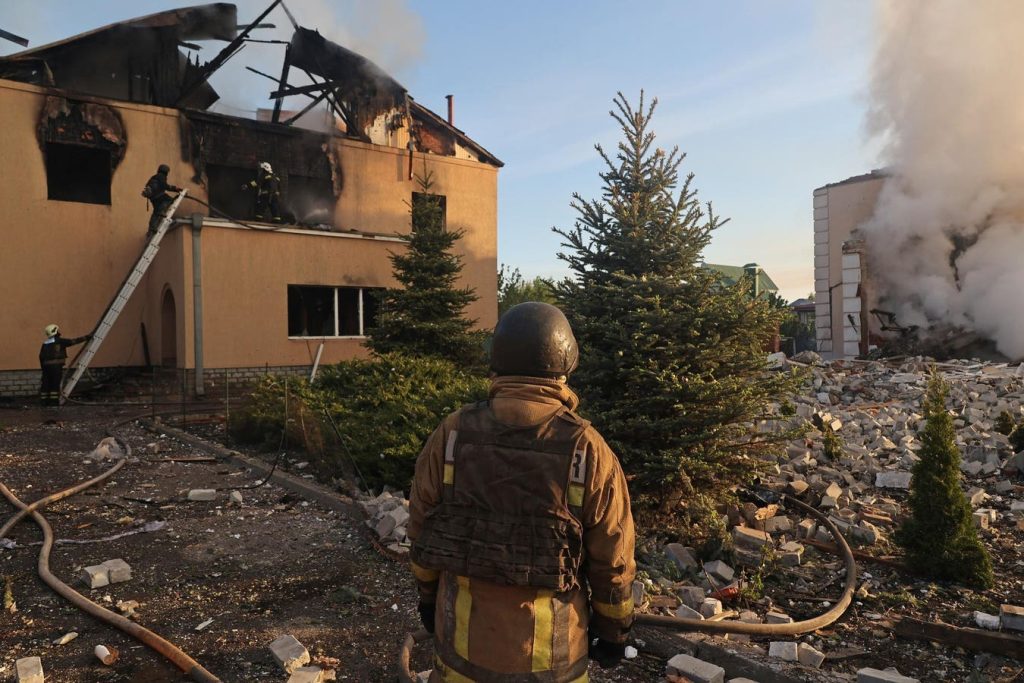Russian forces have launched a major offensive towards Vovchansk in Kharkiv, marking the largest cross-border attack in two years. The offensive has penetrated about three miles west of Vovchansk, prompting Ukrainian reserve units to deploy in response. Although the United States does not expect a breakthrough, there are concerns that Russia may expand its attack. Ukrainian president Volodymyr Zelenskyy has vowed to fight back against the occupiers, stating that Ukrainian warriors, artillery, and drones are actively engaging in combat.
In the Dnipropetrovsk region, Russian shelling in the town of Nikopol resulted in the deaths of two individuals and the injury of eight others. The missile fire also caused significant damage to multiple buildings, homes, and public infrastructure. In the Kharkiv region, Russian artillery attacks in Kupiansk led to one casualty and one injury. Additionally, a school stadium in Kharkiv was bombed, resulting in the injury of seven individuals, including children. The ongoing violence in these regions highlights the devastating impact of the conflict on civilians.
Efforts to rescue Ukrainian children from Russian-occupied areas continue, with eleven more children recently brought home from the Kherson region. The Save Ukraine volunteer group has played a crucial role in rescuing 315 children thus far, although the total number of children affected by the invasion remains unknown. The Children of War platform estimates that around 20,000 Ukrainian children have been abducted or forcibly displaced by the Kremlin since the start of the conflict, underscoring the urgent need for humanitarian intervention.
European Union ambassadors have agreed to allocate revenues from frozen Russian bank assets to Ukraine, pending approval from ministers. The funds would primarily support Ukrainian defense expenditures, with a portion designated for other purposes. European Commission president Ursula von der Leyen emphasized the significance of utilizing the funds to enhance security in Ukraine and across Europe. Ukraine’s Deputy Minister of Justice, Iryna Mudra, disclosed that approximately $280 billion of sovereign Russian assets are held by G7 and EU financial institutions, with efforts underway to locate and potentially access these assets.
The ministry task force has succeeded in identifying two-thirds of the assets, with most being frozen by Belgium and Luxembourg. Additional assets are located in France, Germany, the U.S., Japan, the UK, Switzerland, and Canada. Depending on the distribution mechanisms adopted, Ukraine could gain access to an estimated $15 to $18 billion over the next four years. This financial support would significantly bolster Ukraine’s efforts to defend against Russian aggression and rebuild areas devastated by the conflict, offering a glimmer of hope amidst the ongoing crisis.
As the conflict in Ukraine escalates, the international community faces mounting pressure to provide critical support to those affected by the violence. The devastating impact of Russian attacks on civilian populations underscores the urgent need for humanitarian aid and diplomatic solutions. With ongoing efforts to rescue abducted children and access frozen assets, there are signs of solidarity and solidarity towards Ukraine. However, the road to peace and stability remains fraught with challenges, requiring sustained commitment and cooperation from all stakeholders involved in resolving the crisis.


